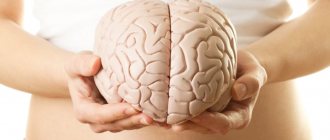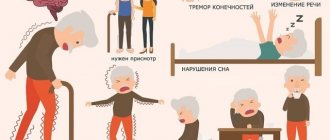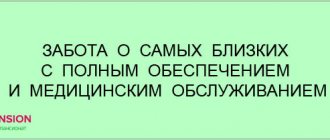Dementia is a condition characterized by persistent impairment of cognitive abilities. The disorder causes deterioration in memory, mental abilities, and orientation in time and space. Over time, people suffering from this disease cease to recognize loved ones and to be able to use devices and objects for their intended purpose. There is an inability to establish social contacts and communicate with others, to perform basic actions to satisfy one’s own physiological abilities. Patients complain of confusion, excessive suspicion and groundless aggression. signs and symptoms of senile dementia in yourself or someone you know , it is advisable to immediately consult a doctor.
How to identify dementia yourself?
The likelihood of developing dementia increases with age and is most common in people over 65 years of age. The disease is one of the factors causing significant limitations in the functional capabilities of older people. This condition is difficult to bear not only for the patient himself, but also for all his loved ones and society. A number of disorders that directly damage brain tissue can lead to the development of the disease:
- Alzheimer's disease;
- cardiovascular diseases;
- head injuries;
- malignant and benign tumors.
The course of the disease goes through several stages, during which the patient’s condition worsens with a certain intensity.
Mild dementia is characterized by symptoms traditionally associated with old age. Among them: mild memory impairment, difficulty performing complex tasks that require special attention or ingenuity.
With moderate dementia, the patient practically loses the ability of short-term memory, can easily lose the logic of a story, or experience difficulty making important decisions. This degree of development of the disorder occurs with pronounced physiological disturbances: sleep disorders, auditory and visual hallucinations, weakness and irritability. Senile pseudo-melancholy manifests itself - lack of emotion and indifference even to important events.
Severe dementia manifests itself in the patient’s inability to recognize even relatives, establish any contacts with others, or simply satisfy independently the basic needs necessary to maintain life.
Mini-Cog
The Mini-Cog test is a simple way to detect dementia, takes only 3-5 minutes and has a high probability. The method will help assess the patient's short-term memory and visual-spatial coordination.
Here's how to test for dementia in older adults:
- The subject is told three words and asked to remember them.
- Afterwards, the person is asked to draw a watch dial in the shape of a circle, put numbers on it and indicate the given time using the arrows.
- At the end of the test, the person is asked to remember and repeat three words from the first task.
Each named word is worth 1 point. Three points indicate the absence of dementia, and zero confirms its presence in the subject. One or two points require moving on to the second test item. If it is performed without errors, then there is no dementia. In other cases, the degree of violations is assessed in accordance with the “clock test” scoring system.
Dementia test: Can you pass it?
The SAGE test is a simple and effective diagnostic method that includes questions on logic, mathematical examples, as well as tasks on the preservation of perception and memory. When performing the test, you should refuse the help of special tools, instruments, devices - anything that will allow you to find out the correct answer.
The method is characterized by high sensitivity and low probability of erroneous results. You can carry out diagnostics yourself, without the help of specialists or loved ones.
Classification of diagnostic tests
Dementia can be detected by performing the following types of tests:
- Assessment of a person’s ability to navigate space, time and his personality.
- Testing different types of memory: short-term and long-term (the ability to remember events that happened recently and what happened many years ago).
- The ability to perform purposeful actions (praxis) is assessed. For example, can a person light matches, etc.
- Visual-spatial functions are tested by drawing various geometric shapes, etc.
- Assessing the patient’s own speech and his ability to perceive someone else’s.
- The patient's ability to remember the purpose of various objects that are shown to him is tested.
- Tests to assess the level of intelligence.
Many tests to check for dementia can be administered to the patient at home, either by themselves or with the help of relatives. However, most often they are used by a neurologist when examining a person for the early detection of dementia.
MIS Memory Assessment
The first signs of impending dementia may be memory loss. To test the ability to remember information and retain it, a short MIS (Memory Impairment Screen) test is used.
The subject is asked to remember 4 words from 4 different categories. For example:
- From the “construction” category – the word “-“history”.
- “City workers” – “policeman”.
- “Personal hygiene” – “towel”.
The patient is asked to repeat these words out loud and is warned that they will be asked to repeat them later. Then they go directly to the test.
MIS Memory Test Questions:
- In 30 seconds, name the maximum possible number of animals.
- In the next 30 s, if more than 4 animals were named, it is proposed to add to the list. If less than 4 animals were named in the first 30 seconds, they give a hint, reminding them of animals on a farm or in a zoo, and offer to continue naming the animals.
- You are given 20 seconds to remember the 4 words suggested at the beginning of the test, and then asked to repeat them.
- For words that the subject could not remember, a hint is given (it is indicated which category the word is from). The answer is given 5 s.
Test Assessment
To evaluate the result, the number of words that the patient was able to remember in step 3 is multiplied by 2 and the number of words that were remembered when the category was recalled is added to the result.
The maximum MIS test score is 8. If the score is less than 6, the patient is offered an additional detailed examination.
https://youtube.com/watch?v=NSBz2ng9SEs%3F
Symptoms
The clinical picture of the disease covers most areas of the human psyche. The disease begins with simple forgetfulness and absent-mindedness. In the middle and late stages, the disease is accompanied by amnestic syndrome, when the patient cannot remember the events of the day and loses the ability to orient himself in space. Signs of dementia in women are the same as in men.
The disease affects mental processes. Thus, abstract thinking is disrupted and thinking operations are disrupted. In the terminal stage, the patient loses the ability to make basic judgments and establish cause-and-effect relationships.
At the last stage of the disease, it is accompanied by complete social disadaptation and personality disintegration. Patients cannot take care of themselves, the function of self-care is lost. Due to severe memory impairment, patients forget relatives, their name and address. At this stage, people suffering from dementia need outside help in the form of washing and feeding.
The prognosis for dementia is unfavorable. Due to severe mental disorders, the core of the personality is destroyed and the higher cortical functions of the brain are lost.
MoCA test Montreal Cognitive Assessment - Montreal Cognitive Assessment Scale
The test was designed to quickly assess the following cognitive functions: attention and concentration, executive functions, memory, language, visual constructive skills, abstract thinking, numeracy and orientation. It has items in common with the MMSE, but there are a number of differences that make it deeper and broader in its coverage of cognitive functions
Result evaluation:
MoCA does not have a scale for assessing the identified score and the degree of cognitive deficit, but it differentiates the impairment of certain types of cognitive functions and makes it possible to determine the location of the lesion.
At the end of the test, all scores are summed up in the right column. The maximum number of points a patient can receive for the test is 30. If a score of 26 or more is obtained, the patient is considered to have no signs of cognitive decline.
Based on a set of tests and neurological examination, signs of frontal dysfunction can be identified in the patient. For example, the MoCa test may reveal a marked decrease in the ability to copy and perform the clock drawing test.
In such cases, it is necessary to conduct additional specific tests for frontal dysfunction, which include FAB and TMT.
Advantages:
1. MoCA includes assessment of visuoconstructive and executive skills. The tasks include a path-making test, copying a cube and a clock drawing test, with the help of which it is possible to assess praxis and, as a result, diagnose damage to the parieto-occipital region and frontal regions.2. Unlike the MMSE, the memory test includes 5 words. Delayed recall is carried out after completing six other tasks that are aimed at activating different areas of the brain, which provides a more reliable assessment of memory.3
Attention tests are presented in the form of three tasks and include listing numbers in forward and reverse order, a complex choice reaction, and serial subtraction of 7 from 100. They make it possible to assess the patient’s ability to switch from one type of task to another.4
Speech quality tasks assess repeated speech and lexical fluency (not included in the MMSE). Together with the naming task, these diagnostic exercises make it possible to differentiate the type of speech disorder.5. The generalization task provides an opportunity to assess logical thinking.6. The test takes into account the patient's education level.
Flaws:
1. Duration of execution is from 15 to 20 minutes, depending on the severity of cognitive decline and the experience of the researcher. As a rule, patients become very tired closer to the middle of the test.2. Labor intensity and large time costs limit the scope of doctors who could use testing in their work.3. Written communication is not assessed.4. Unlike the MMSE, the test does not assess motor praxis.
MMSE scale
The MMSE (Mini-Mental State Examination) mental state scale allows you to identify probable cognitive disorders. This test for senile dementia is used by neurologists for any suspicion of pathology.
The test includes 9 different samples, ranging from simple to more difficult and characterizing:
- orientation in time;
- orientation in space;
- perception;
- ability to concentrate;
- speech (assessment using various methods).
This multiple-question dementia test has a maximum score of 30 points. If a person scores 25-30 points, then there is no pathology. A lower result indicates the presence of cognitive disorders of varying severity. A score of less than 10 points is typical for patients with severe dementia.
The most interesting
Intellectual development Development of memory and attention Stereo pictures Anagram 15 Games to develop attention for children and adults Tag Memory development Speed reading Development of attention and concentration Brain Development Games and exercises for brain development Thinking games Verbal counting Developmental Internet courses Development of thinking Development of imagination Concentration of attention Quick wits Improving memory and developing attention in adults Development games Chess Lateral vision Lucid dreaming Center for Intellectual Development Memory impairment can be prevented with proper nutrition How to develop intelligence? Excess weight negatively affects memory How to strengthen your memory in 40 seconds? Why are there problems with money? Self-development








